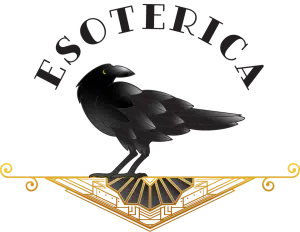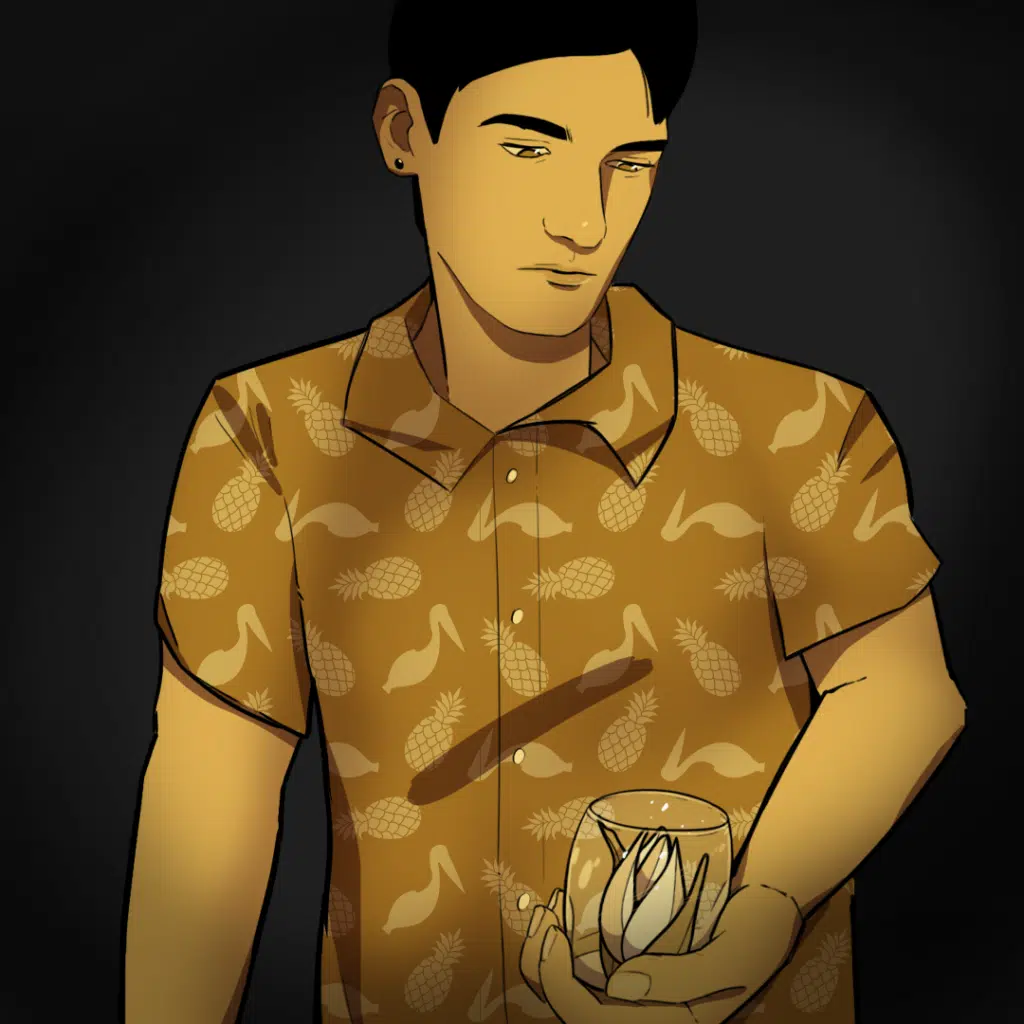(Hiroshima Flower received honourable mention by the judges in Esoterica’s Short Story Contest.)
By Rudy Thauberger,
Normally I find a man wearing a Hawaiian shirt to be inherently trustworthy, but there’s something about this guy. Maybe it’s his cheap sandals. The strap on the right one is broken, leaving the heel flapping against the sole of his foot, pap papping every second step as I lead him into the back of the shop.
Let me say right off, it’s not merely a flower shop; it’s a flower emporium. Anton’s Flower Emporium, rare blooms a speciality. I’m not Anton. Anton is currently incarcerated. I’m what you might call his silent partner, less silent of late, due to circumstances. And suddenly, I’m the one dealing with the detritus of the rare blooms game. The weirdos, the crazies, the unmentionables. And this guy.
“August 6th, 1945,” he says, flopping into my second-best office chair and just launching into it. “The United States drops an atomic bomb on Hiroshima, Japan. Big boom, radiation, untold human suffering, etc. But, out of horror, comes beauty!”
With a flourish, he digs a hand into a gray satchel perforated by dozens of death metal pins, screaming skulls and demons and the like. The drama fades as he continues to rummage, but it gives me time to get comfortable behind my desk and take a closer look at the man. Sadly, the shirt, all pineapples and pelicans, is his most impressive feature. Everything else, the clammy skin, pinprick black eyes, the wet cardboard breath, leaves me cold.
Finally, he hauls out a cheap knockoff tablet and powers it up. “During the cleanup in the aftermath,” he says, “A number of flower bulbs are found in the irradiated soil. Some amateur horticulturalist decides to plant some of them. The result? Lo, and behold….”
Pictures appear on the tablet. Bizarre flowers, strangely mutated, some shrivelled and sad, others exuberantly malformed. Twisted tulips, lilies with distended parts, deeply corrupted flower petals, in colors and shades and patterns like I’ve never seen. “Look at this sexy beast,” he says, tapping a finger on one particularly grotesque specimen. “Stamens for days!”
“What does this have to do with me?” I ask, not caring much for the pitch so far.
“Ah,” he says, reaching once more into the satchel. He has his right foot laid across his left knee, the sandal pap papping as he rummages. Then, like a bad stage magician, he draws out a clear acrylic cube filled with a thick orange liquid. “Observe!”
I do, leaning close, and I see, floating in the gelatinous goo, a flower bulb. A lily, I’m guessing, but I can’t be sure. Well-preserved, robust, but unsettling. I shiver, sensing, even after this tiny glimpse, the hidden form of a monster.
“You hold in your hand” the man says, raising his voice theatrically, “one of the last, perhaps the very last, Hiroshima flower!”
“Is it viable?”
“It rests in a secret stew of nutrients and preservatives, holding the bulb in stasis until such time as love and care restores it to our fallen world.”
I look again, the initial prickly feeling of dread fading and common sense rising. I imagine Anton jumping at this opportunity. Anton, who jumped at the chance to import lady slipper orchids from Borneo. Anton, who leapt with abandon at the chance to sell rock cacti from West Texas. Anton, wearing an orange jumpsuit for 22 more months, 18 with good behavior.
“Listen,” I say. “Even if it is what you claim and even if it is viable, why would I want to purchase this wretched product of human misery? Why would anyone?”
The sandal pap paps as the man gathers himself. “Because the time is ripe!” he roars. “This flower had been shaped by history, the great sin of the atomic age imprinted into its cells, but its grave, beautiful truth is in danger of being lost to time. We live in an age where the dreams of the past are fading, while the dreams of the present remain hollow and half-formed. The owner of this flower will become the guardian and the herald of that forgotten truth. The lost nightmare will be found. For the right person, it is the flower of destiny!”
Ripe time or not, I can’t help wondering if there’s a difference between remembering what was and bringing it back into the world. Is it wrong, as countless dinosaur movies caution us, to bring back the past? Or is the past inevitably destined to re-emerge into the present? And is this a question with which the semi-silent partner of a quasi-legitimate flower emporium is meant to grapple?
We sit in near quiet, listening to our labored breaths and the irregular staccato of the man’s sandal. I hold the cube in my hands, turning it this way and that. The bulb shifts and twists slightly.
I’m reminded of a visit to a freak show in my youth, staring at a shelf of jars full of deformed animal fetuses. Two-headed cats and the like. I remember being terrified and fascinated. I remember too the money I spent to see those freaks. But what I see now, floating ominously in orange goo, feels similar but different. I stare at its strange folds and bulges, and I don’t just see dollar signs. I see something else. Something larger than myself, larger, perhaps, than the entire world. Something uncanny and, yes, achingly, irresistibly beautiful, calling to me.
I shift my gaze from the bulb back to the man’s face, his pinprick eyes, his stained ivory teeth as he gazes upon me with something approaching desperation. I see now that he is a hostage, not a salesman. Behind his satisfied grin and his too firm handshake, he trembles like a forest creature with its leg caught in a trap.
I imagine Anton, completely in this man’s power, dazzled by the oranges and yellows of his shirt, the tropical scene of his cologne, the smooth, carny patter flowing from his lips. But I am not Anton. “My friend,” I say. “I don’t deny the beauty of this mysterious bloom. For I can see the beauty, even now, barely held in check by its fibrous casing, calling out to me, extending to me an invitation to see its beauty for myself. But I am afraid—I don’t deny it—of the consequences of what it wishes me to do.”
The man rises up out of the chair then, his sandal giving one last snap as his feet hit the floor. Sunlight ignites his patchy brown hair from behind, creating a demonic halo. His eyes light with uncanny fire. “Consequences!” he shouts with the voice of a god, “Schmonsequences! Who are we to stand in the path of history? Will you be the one who blocks the path of the raging river? Am I? No, sir. No. The world sleeps and forgets, but men such as we do not! We are awake!”
It is an argument I cannot refute. Instead, I cast my eyes one last time into the orange nutrient depths of the cube to the bulb at its heart. I follow the undulations and curlicues of its fibrous folds, drawn in by its whorls and bulges. The peacemakers, it whispers to me, are forgotten while the monsters and the misbegotten rake the face of history with their terrible claws. I am beauty, it says, and, without me, you will be a forgotten man. The silent partner. The servant of fools.
This truth strikes me like a thunderbolt. I see my life open up before me, unfolding, of course, like a flower. The past flowing through me into the future. I am changed in an instant and now, this abomination must be mine. My will is settled. My destiny etched. Half an hour later, I send the man pap papping out the door, richer by three-fifths of his initial asking price. The prize is belongs to me alone.
I hold the bulb for many long and savory minutes, staring at it. Living history encased in cellulose. I whisper to it, promises of devotion. Fresh water, pure sunlight and fine, virgin soil.
It takes me a week to find a pot worthy of it and several visits to Anton for instructions on how to plant and care for it. I don’t reveal its true nature to him. He’s too petty, too palpably greedy to understand the importance of what I’m about to do. But I spare no effort or expense in my undertaking.
With great care and loving attention, I plant the bulb. Days pass, then weeks. I barely leave its side, living off expensive deli takeout and my own fingernails, eating everything with the desperation of a rabid ferret. As the weeks pass, I begin to despair. Perhaps, I think, the world doesn’t want my child to come forth. Perhaps it wants to forget the great crimes of history and erase the unbearable miseries of the past. Or perhaps it simply fears their murderous return. No matter. I will not be denied. I will not be silent. I will not see my lovely creation slandered by small minds and faint hearts. I wait, I persevere. Finally, a tiny green shoot emerges from the soil. My eyes cascade with tears. My heart bursts with joy. My soul, my love, my perfect terrible child. At last, at last! It lives!
Rudy Thauberger has written the screenplays for the feature films The Rhino Brothers and Chicago Heights (with Dan Nearing), as well as several movies-of-the-week for the SyFy Network. He has also written short films, short fiction and web series. He lives in Vancouver, where he teaches screenwriting. Follow him on Twitter @RudyThauberger or on Instagram at rthauberger

